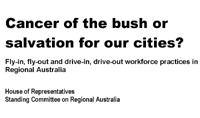Professors' input tabled with FIFO workforce inquiry report
Published on 13 February, 2013
A submission by CQUniversity Professor John Rolfe has been tabled in the House of Representatives as part of the Inquiry into the use of ‘fly-in, fly-out' (FIFO) workforce practices in regional Australia.
Professor Rolfe and his CQUniversity colleague Professor Drew Dawson were involved in the public hearings feeding into the FIFO Inquiry Report.
As Leader for the Sustainable Regional Development Program for CQUniversity's Centre for Environmental Management, Dr Susan Kinnear notes that "through CEM, we are also undertaking research work for three Regional Development Australia committees (in Mackay, CQ and Wide Bay) about responding to growth in resource communities; and have recently lodged a book chapter regarding the public health implications of cumulative resource sector development".
"Five of the 21 recommendations from the FIFO workforce inquiry report include research opportunities in the areas of economics/ health/regional development."
LINK HERE for Prof Rolfe's submission. Transcripts for Prof Dawson's hearing session via Thursday 14 June 2012 Transcripts for Prof Rolfe's session via Friday 24 February .

The written submission by Professor Rolfe focused on the economic justification for FIFO or DIDO (drive‐in and drive‐out) workforce operations in mining and other sectors in Australia and the regional economic impacts likely to be generated.
"Policy settings should be framed around giving people freedom of choice about where to live and work, and transport options between locations where appropriate," Professor Rolfe notes.
"Planning and approval processes for major projects should have better recognition and planning for the needs and impacts on ‘home' communities that provide FIFO and DIDO workforces.
"(There should be development of) appropriate housing stocks in local communities that match the potential inflow of new employees, and avoid high housing costs that can generate perverse impacts on local town development."
Professor Dawson remarked that "we have a two-speed economy not only nationally; we have two-speed economies in local communities. Even though there are economic benefits, they have been corrosive".
"Given the importance of the mining boom in Australia and its centrality to the Australian economy over the next few years, the importance of ensuring that we optimise the benefits of mining to our communities is really important. ... We need to underpin the policy and the decisions in that framework with a really good evidence base."

